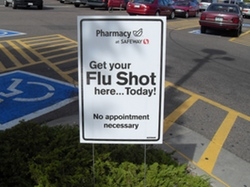
The dreaded flu season is quickly approaching, and pharmacies around the country have been offering vaccines since August. However, a recent survey conducted by Safeway this year found that more people will opt to frequently wash their hands than say they’ll get the flu vaccine.
Another recent study reported that more than 36 percent of healthcare workers are not receiving flu vaccinations.
But influenza should not be taken lightly, says Dr. Risa Vatanka, a Safeway pharmacist and immunization trainer. The number of flu-related deaths in the United States ranges from a low of 3,300 to 49,000, according to the Centers for Disease Control. Children younger than five, seniors, and pregnant women are at high risk for developing flu-related complications.
We asked Dr. Vatanka to debunk common flu myths and what to do if you are unfortunate enough to fall prey to the flu this season.
In the Safeway Seasonal Wellness Survey, 25 percent more people said they thought washing their hands frequently and thoroughly is a more effective way to prevent the flu that getting a flu shot. Is that really the best way to prevent the flu?
The number one way to prevent getting the flu is to get a flu shot. That way you’re building up your own protection and antibodies. Good nutrition, rest, hydration, a frequent hand washing—all of this is very important to keep your immunity up and stop spread of germs. But the number one way is to get a flu shot.
When people touch different surfaces throughout the day, they’re leaving germs. Then, by touching their eyes, nose, and mouth, that’s how germs enter the body. The idea of frequent hand washing can be helpful, but if you wash your hands frequently and then you’re on a crowded bus and someone sneezes on you, you’re really going to want the flu shot.
Twenty-six percent of people surveyed don’t believe flu shots work. A lot of people argue that getting the flu shot actually increases their chances of getting the flu.
That is one of the biggest myths, that people can get sick from the flu shot. You absolutely cannot. It’s protecting you from three strains of influenza, the three strains scientists have researched to be the most likely strains to be circulating this flu season.
One piece that’s really important for people to understand is that when you get a flu shot, it’s not instant. It does take a couple of weeks for your body to build protective antibodies. That’s why it’s important that as soon as the vaccine becomes available, to go in and get the vaccine so you allow your body proper time. So it’s better to get the flu vaccine earlier in the season than later?
The CDC recommends getting the flu shot as soon as the vaccine becomes available. You’re allowing yourself enough time to build the immunity.
The flu season can be really unpredictable. Generally, the season peaks in December, January, and February. But as you know, with H1N1 last year, that hit in April. So, you don’t want to risk it.
How do scientists decide which strain to go with each season?
The scientists research and watch what’s going on in the southern hemisphere. So those strains that are causing illness in the southern hemisphere the year before are likely to be causing the flu in the northern hemisphere. That’s how they formulate the vaccine.
Like mono, can you carry the flu virus and never actually get the flu?
Absolutely yes. A person can be a healthy carrier. They’re feeling great. They’re going to work and shaking hands with people, touching surfaces, spreading the flu virus, and getting all those around them sick. I tell people who come into the pharmacy saying they won’t get the shot because they never get the flu, “Ah, so you’re the one spreading the germs.” The responsible thing to do is to get that flu shot. When you get a flu vaccine, you’re protecting your loved ones, colleagues, and all those you come in contact with. It’s truly being responsible and is a tremendous public health gesture, really.
What are some of the possible side effects that people can expect after getting the flu shot?
At most, a person may have a sore arm for a couple of days. But that’s nothing compared to getting the full-blown flu. It’s really a small price for the return.
Are there any differences between the nasal spray and flu shot?
The nasal spray is approved for people two to 49 years old. It’s a great option for people who are concerned about needles. It’s going to cover the same strains.
If you do unfortunately get the flu, what are your best options to get over it?
If someone should get the flu, there are number of things to do: If it’s diagnosed right in those first couple days, they should see their physician and get a prescription for an antiviral medication. That decreases the viral load and helps so that the person doesn’t have that severe of an illness.
If they aren’t able to get antiviral medication, then the best thing for recovery is good nutrition, rest, and good hydration. Those things will help keep the immune system strong.
Flu shots are now available at local pharmacies. Patients can receive the flu shot or nasal spray for $30 at Safeway, or their health insurance may cover the co-pay if approved. Patients will then receive 10 percent off their groceries. Call your local pharmacy for more information.
Subscribe to Washingtonian
Follow Washingtonian on Twitter
More >> Health | Top Doctors | Well+Being Blog


















